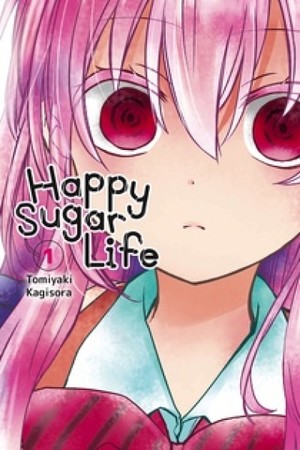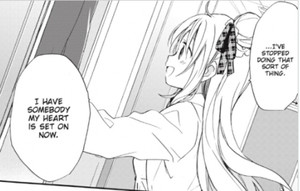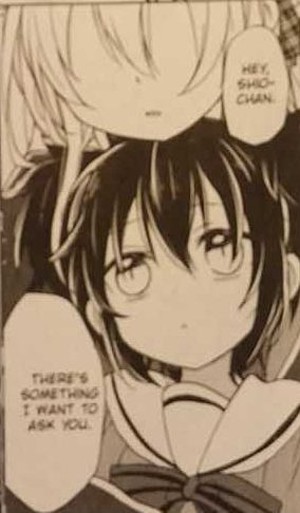The Spring 2019 Manga Guide
Happy Sugar Life
What's It About?
 Satou Matsuzaka, after years of only brief flings, has finally found the love of her life. In fact, the high school student is so enraptured by her newfound partner that it seems she's happier than she's ever been. There's only one problem: Her new partner is a little girl, and one she seems to have kidnapped. In fact, her crimes don't just end at kidnapping: Murder, blackmail…Matsukaza is willing to work herself to the bone and do anything to maintain this love.
Satou Matsuzaka, after years of only brief flings, has finally found the love of her life. In fact, the high school student is so enraptured by her newfound partner that it seems she's happier than she's ever been. There's only one problem: Her new partner is a little girl, and one she seems to have kidnapped. In fact, her crimes don't just end at kidnapping: Murder, blackmail…Matsukaza is willing to work herself to the bone and do anything to maintain this love. Best not get in her way, either. If you attempt to upset the precious life she's carved out for herself, she will do everything in her power to stop you, be you a manager or a teacher or even her love's estranged family members, distraught with grief at her disappearance. Nothing will sully her Happy Sugar Life with awful, mouth-staining bitterness. Nothing.
Happy Sugar Life is an original manga series by Tomiyaki Kagisora. It is published by Yen Press, retailing for $6.99 digitally and $13.00 physically. A 12 episode anime series aired in late 2018, and is currently streaming on Amazon Prime.
Is It Worth Reading?

Rebecca Silverman
Rating: 3.5
Happy Sugar Life isn't so much about people who are broken as it is about people who have been twisted nearly to the breaking point and then left to survive as best they can. It's about flawed coping mechanisms that lead the characters to do terrible, criminal things while they paint over their actions with a veneer of candy-colored brightness, clinging on to whatever they manage to kidnap or steal. It's gross and it's hard to read, but it's also grimly fascinating, especially as this volume encourages us to try to put the pieces together. What made the characters, specifically Satou, the way they are?
The answer almost exclusively feels like “abuse.” We first really see that when Taiyo, a co-worker at one of Satou's part-time jobs, is kidnapped and raped by their female boss. Apart from the fact that we don't often see male rape victims in manga (outside of BL, anyway, where it's more a subgenre), story-wise it means that we're present for Taiyo's entire transformation from happy, normal guy to someone trying to cope with surviving a horrific experience. In his case, he becomes pathologically afraid of older women (which seems to mean any with secondary sexual characteristics, like breasts), because that's who preyed on him during his trauma. He knows that his new urges are wrong, but he can't help himself, and we have to wonder if this was a similar process to what Satou went through that led her to kidnap Shio and murder who at this point I have to assume was either Shio's neglectful guardian, Satou's own abusive aunt, or some unlucky apartment owner.
We definitely see implications that Satou's aunt was awful, and we know that Satou became very promiscuous prior to her meeting Shio, so it's clear that she was looking for love/affection outside the home. That's in part what makes her relationship with Shio in the book so interesting – it doesn't read to me as sexual at all. Loving, yes, and the marriage ceremony that the girls enact at night implies that it's romantic love, but even the bath and kissing scenes don't feel like they have a sexual component. Shio's of course too young for it (we hope), but Satou seems to have decided that love and sex are completely unrelated, and part of her bond with Shio is this nonsexual physical contact. That puts her in an opposing position to her stalker teacher and Taiyo, and it certainly raises some questions about who I assume is Shio's brother, who mumbles the vows Satou and Shio exchange in his sleep.
Happy Sugar Life's first volume goes in a little hard at times on the darkness in its efforts to be shocking and to show us Satou's conflicted life. It's definitely not going to be a series for everyone, either, given the nature of the material. But for psychological horror/mystery fans, this has a lot of potential, and excellent as the vocal cast of the anime is, reading it without voices may make the story easier for some people (like me!) to handle.

Faye Hopper
Rating: 1
What is the point of this?
Does Happy Sugar Life have outlying thematic goals? Is it…some kind of character study? A psychological profile meant to speak to a particular, twisted psychosis, or perhaps a commentary on how institutions can fail to catch this kind of abuse due to negligence and not really caring about the people caught in the cogs? But then, why is it so relentlessly miserable? Why does it seem to revel in the pain of our characters without even attempting to use that pain to speak to a specific condition, social or emotional?
Just…why?
I'll give it this, Happy Sugar Life is unapologetically what it says it on the tin. It presents an extremely messed-up situation while making no bones about how truly, deeply messed-up it is, with no apologism in sight.
But, again…what's the point? This is extremely sensitive, difficult material, and to not even attempt to ground it in any kind of relevance (political, societal, emotional, etc.) makes the entire enterprise ring hollow. It feels like an empty exercise in shock; a what-if-an-idyllic-shoujo-love-story-was-secretly-dark-and-twisted easy, cheap subversion that doesn't speak to anything about the genre space it's playing around in.
An example: Why, after one of our main male characters is assaulted, does he proceed to become romantically infatuated with a missing little girl? Even if I were to read that as a depiction of the emotionally crippling effects of trauma, isn't it a little ethically dubious that a freaking assault survivor falls in love with a little girl as a direct result of abuse? That is a pit of horrible assumptions about mental health and trauma so deep I can't even begin to penetrate it. But that's just Happy Sugar Life. Reality? Who cares? Icky assumptions about mental health that perpetuates negative stigma? Whatever. All that matters is disturbing the reader. Shocking them.
I was nauseous by the time I wrapped up Happy Sugar Life. I felt like I needed a bath. Sometimes that's an essential experience, but here it has no value. No import. There is only misery in the pages of Happy Sugar Life. An empty misery. An unearned misanthropy that doesn't examine the state of the world and come to worst conclusion, but instead traffics in easy, lazy stereotypes and doesn't even bother to have any meaning behind its constant pain and suffering. And some might say that's the point. That people suffer and there is no recourse, no meaning. But that's a shallow point to make, and one definitely not worth slogging through a series this outlandishly wretched to understand.
discuss this in the forum (35 posts) |
this article has been modified since it was originally posted; see change history
back to The Spring 2019 Manga Guide
Feature homepage / archives